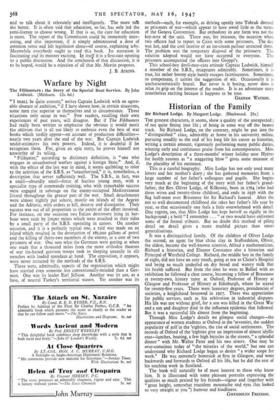Historian of the Family
Sir Richard Lodge. By Margaret Lodge. (Blackwood. 21s.)
THE greatest characters, it seems, show a quality of the unexpected ; of not quite fitting into life ; of being in some way off the beaten track. Sir Richard Lodge, on the contrary, might be put into the " distinguished " class, admirably at home in his university milieu, pursuing steadily to the end of his long life his career as historian, writing a certain amount, vigorously performing many public duties, winning early and continuous praise from his contemporaries. Miss Lodge's description of a three-months' winter holiday near Hyeres for health reasons as " a staggering blow " gives some measure of the placidity of his existence.
This is a careful biography. Miss Lodge has not only used many letters and her mother's diary ; she has gathered memories from a large number of her father's colleagues and pupils. She begins very much at the beginning of the story with her father's grand- father, the Rev. Oliver Lodge, of Kilkenny, born in 1764 (who had three wives and twenty-three children), and ends in 1936 with the flag half-mast over Brasenose for Sir Richard's funeral. After the not so well documented childhood she takes her father's life year by year, so that occasionally one feels a little overwhelmed with detail. One regrets, too, that Miss Lodge has kept herself so rigidly in the background ; a bold " I remember . " or two would have enlivened some of the formal tributes. But no doubt this method of piling detail on detail gives a more truthful picture than smart generalisations.
It was a distinguished family. Of the children of Oliver Lodge the second, an agent for blue china clay in Staffordshire, Oliver, the eldest, became the well-known scientist, Alfred a mathematician, Richard a historian, and Eleanor Constance also a historian and Principal of Westfield College. Richard, the middle boy in the family of eight, did not have an easy youth, going at ten to Christ's Hospital and being so much underfed on dry bread and watery milk that his health suffered. But from the time he went to Baffled with an exhibition he followed a clear course, becoming a fellow of Brasenose at twenty-two, history tutor at Oxford, Professor of History at Glasgow and Professor of History at Edinburgh, where he stayed for twenty-five years. There were honorary degrees, presidencies of societies, a knighthood bestowed in 1917. There was appreciation for public services, such as his arbitration in industrial disputes. His life was not without grief, for a son was killed in the Great War and a son and daughter died in the influenza epidemic that followed. But it was a successful life almost from the beginning.
Through Miss Lodge's details we glimpse social changes=the appearance of women students at Oxford in the 'seventies, the sudden popularity of golf in the 'eighties, the rise of social settlements. The records of Oxford of the 'eighties give an impression of almost idyllic ease—lunches, boating, a few high bicycles in the streets, " a splendid dinner" with Mr.-Walter Pater and his two sisters. One may be over-conscious today of " the miseries of the world," but one can understand why Richard Lodge began to desire " a wider scope for work." He was extremely homesick at first in Glasgow, and went backwards and forwards to Oxford all his life, but he did the rest of his teaching work in Scotland.
The book will naturally be of most interest to those who knew him. It is illustrated with some pleasant portraits expressing the qualities so much praised by his friends—vigour and (together with "great height, somewhat truculent moustache and eyes that looked so very straight at you ") humour and kindliness.
GWENDOLEN FREEMAN.


































 Previous page
Previous page